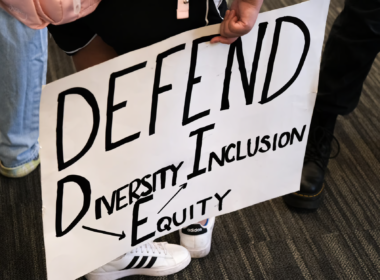On the small burgundy shag pulpit at the front of the Truth Tabernacle Church in Greensburg, Indiana, several toddlers stand in line, waiting for their turn to speak into the mike. Up next is a blonde little boy, “aw”-inducingly cute in his navy vest and khaki pants.
He holds the mike in front of him with chubby little fingers and preternatural confidence, then opens his mouth to sing in the cutest little pint-sized falsetto you’ve ever heard:
“The Bible’s right, somebody’s wrong.
The Bible’s right, somebody’s wrong.
Romans one, twenty six and twenty seven;
Ain’t no homos gonna make it to Heaven.”
The congregation whoops and hollers and applauds even before he gets the last line all the way out. He beams incredulously and soaks up the praise. You can tell by his dizzy, shell-shocked look that this moment is gonna leave a mark.
Last month, this video evidence of good-old-fashioned fundamentalist parenting went viral. As I watched it for the second time in a row, I realized that it had been a while sense I’d seen an aughties-era bigoted Christian flame up.
Whatever happened to the inflammatory right? When’s the last time you saw a red-faced conservative belligerent win the evening news by outs-shouting their weaker liberal counterpart? Or even saw a news story about the merits of Creationism or prayer in schools? Did the ultra-conservative right just drop off the map?
If you’ve been keeping up with the news they did. Obama himself announced the official end of partisan politics at the Democratic convention way back in 2004. Not long after he proclaimed that “there is not a liberal America and a conservative America”, the media discourse changed from bickering factions to a post-partisan paradigm of hope and change. The Ann Coulters oozed back into the shadows and affable Anderson Coopers took center stage. And republican candidates are so watered down, we barely know who’s running.
The right has been so thoroughly dressed down that some eager journalists have announced the end of Christianity itself. Earlier this year, the Atlantic and Foreign Affairs declared that even the masses no longer respect overtly political organized religion and that congregants were leaving churches in droves and atheism is on the rise.
But although the collective media outlets have already sung “ding dong the conservative Christian right is dead”, the truth may not be so cut and dry. Videos of singing, hate-mongering toddlers are surely a sign. I mean, his parents had to come from somewhere. At least two people on the Christian right haven’t agreed to the détente. And according to national surveys, the numbers are way larger than that.
Every year, the Pew Research Center conducts an American Values survey. They poll random citizens from all over the United States about how they feel about certain fundamental values: race, government regulation, equal opportunities, maintaining the social safety net, etc.
And over the past few years, their results have shown that partisan differences aren’t just failing to shrink, they’re getting larger — by like a lot. In fact, today, partisan differences are further apart than they have been at any time since the Pew Center began collecting data in 1987.
In 2002, for example, Republicans and Democrats only had widely different views on only 11 out of the 48 polled questions. That’s roughly the same score they’ve tallied since 1987. But by 2012, the gap crept up point by point until it was 19 out of 48 questions.
That’s a much bigger gap. And 71 percent of Republicans told the Pew Center that they’d like to see it wider. Unless you aren’t old enough to remember the Bush era, that’s a frightening statistic.
But where are these rabid right wingers? They certainly don’t dominate the news feeds anymore. And from where many of us sit — comfortably in our urban metropolises — it can be hard to remember that they existed at all. Gays feel safe to come out of the closet, our president is black and affable, and even health care is finally starting to make sense.
But a lot of the problem with our narrow purview has a lot to do with where we sit. Most of us will spend our lives relatively stationary in one big city or another. Those of us who have the impulse to travel the “world” will restrict the noun’s definition to bustling cities. Few of us will ever branch out to the smaller towns in the United States. I’ve never heard of anyone who saved their vacation days to visit Paris, TX or Arapahoe, WY.
From a cosmopolitan city that has all you need, it can be tough to realize that the United States is a big place: 2,959,064 square miles big. And most of that is dotted by tiny towns that you’ll never hear of filled (or partially filled) with people that live and experience life differently than their cosmopolitan counterparts.
And for the most part, we have no clue what’s going on out there in that sea of strangers. Most of what we know of the world — the news and the blogosphere, let’s be honest — is concentrated on three or four major metropolises out of 30,000 cities in the United States. Save the local nightly news and the local AP Wire paper, most of what you know about the world concerns Houston or Dallas or New York or Chicago. You’ll never hear anything about Kimmswick, Missouri unless all of it burns to the ground.
But those little places contain most of the 311-odd million people in the United States. They are places where values tend to stick beyond political defeats. It’s where the conservative Christian base was and always is; even when their representatives are out of office.
And as the world gets more liberal around them, some of them are pushing back. The Christian right’s relatively new youth movement has turned conservative’s attention to their children. Through home schools and youth groups their pushing and keeping their children far to the right of the rest of us. And as the Pew Center gap continues to widen and these kids reach the age of majority, the gains that liberals made under Obama may come under siege.
Whitney Was Right, In a Way
A wise philosopher once sang once sang “I believe the children are our future. Teach them well and let them lead the way.” The fact that said philosopher later got high and drowned in a hotel bathtub shouldn’t tarnish the message.
Sometime in the 80s — a few years after the Moral Majority gave birth to the modern Christian right and around the same time as advertisers began focusing on youth marketing — the Christian right turned its attention to its youth.
If you were a kid attending church at the time — or one of the megachurches that sprouted up not to long after — you may remember being liberated from the boring adult sermon and redirected to a youth minister that was more “hip” to what the kids were doing. There was even new music to listen to. Tons of rock musicians not talented enough to have regular careers put Christian lyrics to their terrible tunes to give kids a chance to connect to God on their own terms (I’m talking to you Creed).
In other, smaller towns in the world, Christians were taking this new focus on children more seriously. Sometime around 1985, the Quiverfull movement gained popularity amongst conservative evangelical Christians. Quiverfull families take “be fruitful and multiply” very seriously.
Single, two parent families like the world-famous Duggars would have as many children as they could (the Duggars had 19). And then they would homeschool and carefully raise those children for the lord with strict moral, social and sometimes political values. How better to spread the word of God in the world than to populate it with as many evangelicals as you can squeeze out?
And in some places, parents and youth leaders are taking the youth movement even further and trying to raise a voting conservative Christian army for God.
Take Levi O’Brien for example. Levi is from the sleepy town of Lee’s Summit, Missouri. It’s run through by a tarred, narrow main street lined with plenty of Burger Kings and Jiffy Lubes that scroll by as you drive then end abruptly in the brown, grassy hinterland that spreads between little towns like this.
Levi’s church — Christ Triumphant — is just off that main road. It’s one of a million small-town, white, wooden Pentecostal churches just like it. Inside, on another shag pulpit, is a group of children all under the age of 13, most probably closer to 9. They’re wearing fatigues and matching war paint and dancing militantly with lots of staccato gesturing and fist pounding.
They are God’s child army, pantomiming their fervor and willingness to fight for conservative values to a 500-seat congregation.
And a fatigue-clad child army for God is just the type of unsettling imagery that makes someone think, “I’ve got to get this on film”. And that’s exactly what Rachel Grady and Heidi Ewing did. The result was the widely circulated documentary Jesus Camp.
Before Jesus Camp, many people had never heard of the conservative Christian youth movement, much less its militant, political iterations. And people were shocked to find that in some small towns in America — some of the same ones that the Moral Majority tapped to elect politicians like President Bush — conservative Christians were indoctrinating young children with fundamentalist religious and political views to shape them to take on the Whitehouse for Christ.
One of the leaders of these youth movements — and the central antagonist in the Jesus Camp documentary — was Becky Fisher. Fisher is a short, wide, severe-looking woman with short, blonde severe-looking hair.
If you’ve ever spent any significant amount of time in an evangelical church, you likely know a woman just like her: the kind whose singular focus on all things Godly conveniently fill in gaping holes in her social and personal life. Christianity — fundamentalist or otherwise — has always offered a convenient way for adherents to shift their personal paradigm from “I’m lonely and have no real friends” to “I intentionally avoid ‘sinners’ because God told me to.” Thanks in part to Nietzsche’s Transvaluation of Values, withering spinsters easily become warriors for Christ.
The militant, fatigue wearing “prayer warriors” are her doing. As they perform, she looks out at them proudly and intently the way a general might. After they finish performing and the congregation trickles out, she singles out a new kid in the audience — Levi O’Brien.
She talks to him about his God and his personal faith in the over-animated voice and “awesome”-heavy dialogue that works on kids who don’t have a lot of friends. She talks fast and friendly and asks lots of personal questions that always end in compliments. She is a saleswoman. It would be impressive if she weren’t so predatory.
Levi is captivated and soaking in the personalized attention. He is what Becky Fisher calls “hooked”. He’ll spend the rest of the Jesus Camp documentary getting more passionate about the church’s brand of political and religious values. By the end of Jesus Camp, Levi has transformed from a shrinking violet to a rousing speaker, a soldier in God’s little kid army who says that Jesus holds his arm when he writes his sermons.
Becky’s not afraid to talk openly about her motivation as a youth leader. She explains matter of factly to the camera that “if you look at the world’s population, 1/3 of that 6.7 billion people are children under the age of 15. Where should we be putting our efforts?” Becky’s opinion mimics what most conservative evangelical Christian youth leaders who’ve made their way into the public eye say.
Christian conservative youth leaders aren’t afraid to talk about the merits of indoctrinating kids while their brains are still soft and deliciously immature. Bob Bland, leader of “The Lord’s Boot Camp” — a youth missionary training camp with 700 annual attendants — eagerly explained to his 48-Hours documentarian that “Once they (the 700 youth missionaries he trains annually) leave this boot camp, we have no control. So what we do here is sow the seed. We don’t really do the work. We don’t do the indoctrination. It’s the holy spirit that does that.”
Perhaps the most shocking part of the Christian conservative move on the right is its success. The children in the documentaries like “Jesus Camp” and “The Lord’s Boot Camp” are fervent and devoted. They weep abundantly during prayer time and wail and rock back and forth when their youth leaders preach about the importance of electing “righteous judges” to end the genocide of abortion and “wrong government”. It’s unnerving. They look like a pint-sized fanatical jihad for Christ and there are hundreds of them in some shots.
The ABCs of Christian Fundamentalism
When many of these kids leave youth groups like Becky Fisher’s, they don’t go home to public schools that support a plurality of views and alternatives to their narrow view points. They go to homeschools.
One of the many ways Jerry Falwell’s — leader and creator of the Moral Majority that gave birth to the new politicized Christian right in 1979 — Moral Majority sought to “save America from its moral decline” was to denounce the public school system. Falwell depicted all secular education as a “breeding ground” for atheism, secularism and humanism that is in direct opposition to Christian morality.
Since the birth of the Moral Majority, the homeschool population in the United States has skyrocketed. Between 1999 and 2007 (the last year that data was available), The National Center for Education Statistics (NCES) reported a 74% jump in homeschooled children.
Eighty-three percent of those polled families reported to the NCES that they chose homeschooling to impart “religious or moral instruction” to their children. And over 75% of them identified as Evangelical Christians.
Currently there are at least 2 million homeschooled children in the United States. In all likelihood there’s a lot more, But roughly one-quarter of the states don’t require parents to report homeschooling. And there may be even more conservative Christian homeschooled children.
Robert Kunzman, Associate Professor of Educational Studies at Indiana University and author of Write These Laws on Your Children: Inside the World of Conservative Christian Homeschooling, says that conservative Christian homeschool children are likely to be even more underreported because of their distrust of secular government agencies.
The world of conservative Christian homeschooling is often quite different from the school experiences that most of us remember. Many start every school day with a pledge of allegiance to the Christian flag followed by a separate pledge of allegiance to the Bible.
After that, some homeschooled children open up faith-based textbooks with titles like “Exploring Creation with Physical Science”. Some inject Christian values in places and remove faith-challenging bits following the popular homeschooler motto “if it doesn’t line up with the Word, throw it out”.
Others reframe entire subjects. Christian conservative textbooks like those by publisher A Beka declare that “Students will learn to recognize the hand of God in history and to appreciate the influence of Christianity in government, economics, and society.” And sometimes their curriculum is filled with fallacies like Galileo gave up his scientific beliefs for God, that global warming is a fallacy.
And lots of conservative Christian kids are learning these “alternative viewpoints”. Publishers like Bob Jones, A Beka and Sonlight share in a billion dollar industry. And the information they contain doesn’t just inform homeschool students. They’re carried by some conservative Christian schools as well. And sometimes they make the news when their advocates try to push them into public school curricula in conservative small towns.
According to Kunzman, who spent years studying and visiting homeschool groups, conservative Christian parents aren’t as agenda driven as youth leaders like Becky Fisher and Bob Bland. They simply see it as their job to mold and shape their children according to the way they believe God intended, separate from the secular influence of the world around them.
But the very fact that they are raised to grow up at odds with the rest of the secular world could certainly have negative consequences. As we’ve seen historically, when something is at odds with the purview of the Christian right, it’s the world that has to change around them. Adjustment of their viewpoint or acceptance of differences isn’t always taught as an option.
Consequently, for many conservative Christian kids homeschooled and otherwise, education doesn’t always end in the classroom. As a rule, Christian conservative kids are much more involved in the civic activities than public school children.
Many of them are recruited by political youth organizations waiting to harvest the hearts and minds that youth group and homeschool curriculums have prepared (intentionally or not); organizations like Generation Joshua. Generation Joshua is a civic education program run by the Home School Legal Defense Association: a Christian Conservative homeschool organization that has 85,000 adult and 250,000 youth members.
Generation Joshua is outspoken about its mission to help Christian conservatives “take back America for God.” In online and summer camp programs, they teach Christian Conservative kids how to organize groups, coordinate voter registration drives and campaign for conservative candidates.
Essentially what the Christian right has created — at times consciously — is a generation of children educated to have views that are by their nature incompatible with secular society. And these millions of conservative Christians living in Small Towns USA are learning early how to engage the country politically to make it more closely reflect their views and values.
Maybe They’ll Grow Out of It
When I was a kid, to circumvent an endless loop of “whys”, my mother would just lie to me. One day, instead of telling me that white bread was unhealthy for me — especially since we have a family history of diabetes — she just told me that it would turn to glue in my stomach. And that glue would stay there and block things up until I finally had to have surgery.
Adult Me knows that it’s not true. But a tiny part of Small Me isn’t really sure. I’ll eat white bread on occasion, but not without hearing the tiny voice of Little Me yelling “No! Don’t do it.” It’s really hardwired in there. And there’s nothing I can really do about it.
Kunzman in his experience suggests that while Christian conservatives certainly raise their kids to be polarized, that’s no guarantee that they will continue to be so as they enter adulthood and make their own decisions. But Becky Fisher’s theory is that anything that’s successfully drilled in before the age of 9 sticks in forever.
That was certainly the truth with her former protégé Levi O’Brien. A few months ago, Morgan Spurlock — director of the documentary Supersize Me and the TV show 30 Days — interviewed the now 19-year old Levi O’Brien. During the soft touch Q&A, Levi assures his audience that he hasn’t lost his faith. In fact, he says that, “if anything [he] loves Jesus more now than he ever did before.” He also says that if he hadn’t been to Fisher’s conference he doesn’t know if he’d believe in God right now.
Nearly past his teenage years, he’s doing his best to convert souls, spread the message and espouse the conservative Christian values he learned at Jesus Camp. He stars in several YouTube videos where, with a sense of megalomania, he screams and yells his message, presumably trying to capture the audience with volume.
But his career as an evangelical isn’t going very well. Some of his 400+ Facebook friends frequently take the Mickey when he updates his status with his fundamentalist messages. Some of the problem may be with Levi himself.
Puberty was not good to Levi. No longer an attractive, affable 12-year old boy, Levi is a weedy young man with the rounded shoulders and pallor of a gamer who doesn’t frequently leave the computer monitor…except maybe to go to church. And when his Facebook followers get too snarky in their criticisms, his mom pops on his page to help defend her son.
Despite his central role in Jesus Camp, Levi O’Brien is unlikely to become a superstar. He and other youths like him seem laughable, dismissible like the video of the homophobic toddler. But the Christian right may be slowly changing its image.
On the internet, the new youth movement knows that you don’t get views or votes by the same aggressive barking that rallied the faithful the first time but then got them laughed out of the Whitehouse. Many may be small-town and fundamentalist, but they’re not ignorant. And this time they’re revamping their image and using the carrot instead of the stick.
In a clip entitled “Changing the Culture” that didn’t make it Jesus Camp, but is on one of the many outtakes available on YouTube, a Conservative Christian youth leader says, “With those kids, god wants them not all to become preachers because that’s only one sphere of society. But you could get these little radical kids in Hollywood and get them in sports and arts and entertainment and religion? That’s how a culture is changed.”
YouTube is just lousy with videos of attractive young conservative Christians espousing their conservative values. One short by the Women of Virtue Organization is a Q&A featuring ridiculously good looking Mormon college students discussing their feelings about “immodest” women.
The kid on the right has a 100 watt smile that’s probably responsible for the video’s 23,000 hits and the 5,000 more it receives every time I tune in. The new affable Christian youth is in and the old guard is out. And as these millions of homeschooled, youth grouped kids come of age, they may start making their mark in the political arena.
If it seems far-fetched, consider someone like Tim Tebow. Most of us know him as the football player who prays or “Tebows” after a touchdown. But before you knew him as your favorite praying football star, Tim Tebow was one of those millions of Christian conservative homeschool kids you’ve never heard of.
If you’ve read his Wikipedia page, you know him as the love child of Jesus and Superman. Even before he was born, he managed to escape the threat of abortion. Even though his missionary Baptist mother was slipping in and out of a coma and warned that she might die of dysentery if she didn’t abort, she refused. And thanks to her piety, God rewarded the world with a big, strapping Christian football player known for his “uncommon physical courage” on the field.
And when he’s not giving it all in a game — he played the second half of one game with a broken leg — he’s helping out at his father’s orphanage. I didn’t keep reading, but I’m pretty sure he went on to cure cancer and save some babies from a burning building for Jesus.
And we haven’t even started to talk about his all-American looks. He’s like JFK’s younger more attractive brother. And he’s friendly and affable in that “Hi there, it sure is genuinely good to meet you kind of way.” He’s already a media darling: His ESPN “Faces in Sports” documentary segment was titled “Tim Tebow: The Chosen One”. His autobiography spent 24 weeks on the bestseller list, and in 2011, Marvel turned him into a superhero named Super Tim. Presidents have been elected for less.
And behind that apple pie smile, Tebow is just as conservative as he is popular. During the Super Bowl, he appeared in a commercial for Focus on the Family, a pro-life organization despite media controversy. His Twitter page is full of positive affirmation and shouts out to Jesus. And he’s not afraid to say things publicly like “We need to get back to one nation under God, and be role models for kids.” And once elected, he’d smile and win hearts and minds all while compassionately eradicating women’s right to choose.
The homeschooled and conservative Christian generation who exploded onto the seen in the 80s and 90s are just now coming of age. Millions of conservatives like Tebow are just now exercising their voices and making their mark on the world. And it’s a world where their views are threatened by liberal issues gay marriage and universal healthcare (for some reason) giving them a common rallying point to gather around.
The future is always an open book. The youth movement of the Christian right is still relatively new. And we can only sit back and see what happens. But one things for sure, it’s probably too early to declare the conservative Christian right out and down for the count.











